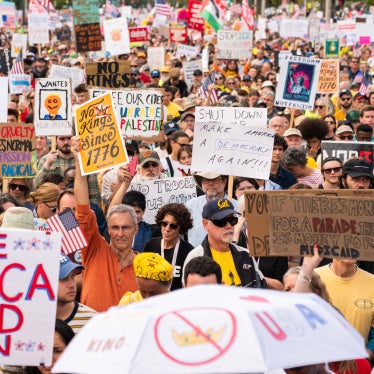Mr. Herman Van Rompuy
President of the European Council
Rue de la Loi 175
B-1048 Brussels
Mr. José Manuel Barroso,
President of the European Commission
Rue de la Loi 200
1049 Brussels
Brussels, February 6th, 2012
Re. European Union-China summit
Dear President of the European Council,
Dear President of the European Commission,
We write in regard to the forthcoming European Union-China summit, scheduled to be held in Beijing on February 14, 2012. While we appreciate recent statements by the EU High Representative and the EU Ambassador to China expressing concerns about the deteriorating human rights environment in China, we believe that EU efforts to advance human rights will be compromised and effectively undermined if you fail to reiterate the EU’s human rights concerns and expectations with regards to remedies, both publicly and privately, during the forthcoming Summit.
The Chinese government continues to impose sharp curbs on freedom of expression, association, and religion; openly rejects the principle of judicial independence; and arbitrarily restricts and suppresses human rights defenders and organizations, often with extrajudicial measures. It systematically condones, with rare exceptions, abuses of power in the name of “social stability.” The security apparatus, which remains hostile to liberalization and legal reforms, appears to have steadily increased its power since the 2008 Beijing Olympics.
Since mid-February 2011, Human Rights Watch has documented a disturbing increase in the Chinese government’s use of enforced disappearances, arbitrary detention, intimidation, and house arrest to silence those exercising their right to the freedom of expression. In recent weeks, Chinese courts have handed down severe prison sentences to a quartet of writers prosecuted for writings critical of the ruling Chinese Communist Party. Chen Wei received a nine year prison term on December 23, 2011 on charges of “inciting subversion of state power” for publishing government criticism on-line. Three days later, a Guiyang court handed down a 10-year sentence on the same charge to Chen Xi, for similar on-line criticism of China’s one-party rule. Then on January 18, 2012 a Wuhan court sentenced Li Tie to a 10 year prison term for “subversion of state power” for writings which included reference to the official taboo topic of the June 1989 Tiananmen massacre. And on January 18, police charged veteran human rights activist Zhu Yufu with “inciting subversion of state power” for writings including a poem which police interpreted as a call for popular unrest against one-party rule.
Despite the Chinese government’s rhetorical commitments, the legal system in China does not protect the rights of activists and critics. In September 2011 the Chinese government announced proposed revisions to the criminal procedure code that would in effect legalize rather than prohibit disappearances; such a step runs counter to the government’s obligations not to deviate from the standards set out by international human rights covenants it has ratified, including the International Covenant on Civil and Political Rights. Six of the country's most prominent human rights lawyers -- Teng Biao, Tang Jitian, Jiang Tianyong, Liu Shihui, Tang Jingling, and Li Tiantian -- were "disappeared" by the police for periods of time ranging from several weeks to several months. Following their releases, some have described having been tortured in custody, and few have resumed their outspoken advocacy.
Other human rights lawyers have been disbarred, or warned by judicial authorities not to take up particular cases. In another recent instance, government officials in Wenzhou ordered lawyers there not to represent civil compensation cases filed by families of victims of the July 23, 2011high-speed rail crash. They relented only after fierce on-line criticism of the move by Chinese netizens.
Despite the Chinese government’s well-documented attacks on human rights defenders and civil society activists in recent years, Chinese citizens are increasingly aware of their rights and more assertive in cases in which those rights are denied. Public frustration about the government’s denial of basic rights and freedoms, magnified by a lack of rule of law, contribute to the more than 100,000 “mass incidents” or protests are estimated to occur annually in China. Those protests heighten the Chinese Communist Party’s concerns about potential threats to its 61-year monopoly on power, which have already resulted in greater budgetary allocations for “social stability maintenance” than national defense.
In addition, we remain gravely concerned about the situation in Tibet, where heavy-handed security measures appear to have fueled tensions between Tibetans and Chinese authorities in the region, contributing to desperate acts of protest by individuals, including sixteen self-immolations. Since the protests of 2008 in the region, the Chinese government has imposed drastic restrictions on Tibetan monasteries in the Aba prefecture of Sichuan province and other parts of the Tibetan plateau. These measures include brutal security raids, arbitrary detentions of monks, increased surveillance within monasteries, and a permanent police presence inside monasteries to monitor religious activities.
While we note and appreciate EU public and private diplomacy about the human rights environment and individual cases in China, Human Rights Watch nevertheless believes that EU efforts in this regard are not sufficiently robust and consistent. These efforts have not been designed to seriously affect change in China’s appalling human rights record or support the forces for positive change inside China, including those courageous individuals who dare to challenge abusive government conduct and demand that their constitutional rights of free expression be respected by their government.
As the “Arab Spring” reminds us, the EU and others must take public opinion into account when formulating policies towards third countries. Significant numbers of people in China, too, are making known their complaints about issues ranging from public health to corruption, from land seizures to access to justice. In doing so, they face a range of possible retributive measures, including torture and imprisonment. The EU has quite visibly demonstrated support for efforts to ensure better respect for human rights around the 2011 public protests in North Africa and the Middle East. It should do no less in response to peaceful public protest and government crackdowns and abuses in China.
On the occasion of the EU-China Summit we urge that you publicly:
- Express the EU’s support for and solidarity with independent Chinese voices by meeting with human rights defenders and civil society activists inside and outside China, such as the writer Liao Yiwu, who is fled to Germany to see refuge from Chinese government persecution;
- Articulate concrete benchmarks for human rights progress prior to holding future rounds of the EU-China Human Rights Dialogues;
- Call for the unconditional release of all those imprisoned and detained solely for the peaceful exercise of basic rights, such as the freedoms of expression, assembly, association, and religion. In particular we also urge that you publicly reiterate the EU’s call for the release of Liu Xiaobo, co-drafter of Charter ’08 and recipient of the 2010 Nobel Peace Prize.
- Call for the end of extralegal detention or other extralegal limitations on the rights of activists and their families, such as Liu Xia; blind legal activist Chen Guangcheng and his family; and public health activist Hu Jia and his family;
- Call for the Chinese government to reinstate those lawyers disbarred in recent years for their engagement in public interest and human rights cases, and remove other barriers on their ability to practice law;
- Publicly commit that EU member states should not forcibly return asylum-seekers from China who have reason to fear persecution;
- Urge the Chinese government to ensure that respect for internationally recognized human rights is not compromised in the name of public or national security and;
- Urge the immediate establishment of meaningful dialogue between the Chinese government and representatives of Tibetans to address the underlying grievances in the region.
Syria
We also urge you to encourage your Chinese counterparts to support efforts at the United Nations Security Council to exert pressure on the Syrian government to cease the serious human rights abuses that the United Nations High Commissioner for Human Rights says may amount to crimes against humanity. We believe that the shift in the position of the League of Arab States and its recent decision to seek the support of the Security Council for its proposed plan to end the crisis creates an opportunity to overcome China’s initial reluctance to support Security Council efforts to end the crackdown. We urge you to:
- Express concerns about China’s failure to respond to the crimes documented in Syria and the fact that what may amount to crimes against humanity is allowed to continue with utter impunity; and
- Seek China’s support for efforts to advance the protection of civilians, including through a UN Security Council resolution that would help advance international pressure on the Syrian government to halt serious human rights abuses, curb impunity for the atrocities, ban arms transfers to forces engaged in possible crimes against humanity
Making publicly known both the EU’s concerns about human rights violations in China and your expectations of China internationally is important. Public statements demonstrate the EU’s commitment to the issues, and, more important, provide critical support to all those in China and elsewhere struggling to exercise and protect their human rights.
We look forward to discussing these issues at your convenience.
Yours sincerely,
Lotte Leicht
EU Director
Human Rights Watch
Sophie Richardson
China Director
Human Rights Watch
CC:
High Representative of the European Union for Foreign Affairs and Security Policy and Vice-President of the European Commission, Baroness Catherine Ashton
Secretary-General of the European External Action Service (EEAS), Mr. Pierre Vimont
Deputy Secretary General for the European External Action Service (EEAS), Ms. Helga Schmid
Deputy Secretary General for the European External Action Service (EEAS), Mr. Maciej Popowski
Head of Cabinet to President of the European Council, Mr. Franciskus van Daele
Advisor to the President of the European Council for Asia, Mr. Sem Fabrizi
Head of Cabinet to President of the Commission, Mr. Johannes Laitenberger
Head of the Delegation of the European Union to China, Amb. Markus Ederer
Managing Director for Asia and Pacific, EEAS, Mr. Viorel Isticioaia-Budura
Head of Division for China, EEAS, Mr. George Cunnigham
Director of Human Rights and Democracy Unit, EEAS, Ms. Veronique Arnault
Human Rights Desk Officer for China, EEAS, Mr. Tobias King
Chair of the EU’s Political and Security Committee, Amb. Olaf Skoog
Chair of the EU’s Working Party on Asia, Mr. Boguslaw Majewski
Chair of the EU’s Working Party on Human Rights (COHOM), Mr. Engelbert Theuermann
President of the European Parliament, Mr. Martin Schulz
Vice-President of the European Parliament responsible for Democracy and Human Rights, Mr.
Edward McMillan-Scott
Chair of the European Parliament’s Foreign Affairs Committee, Mr. Elmar Brok
Chair of the European Parliament’s Subcommittee on Human Rights, Ms. Barbara Lochbihler
Chair of the European Parliament’s Delegation for relations with the People's Republic of China, Mr. Crescenzio Rivellini





